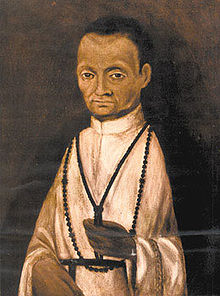Some of the saints signify sanctity in a way that goes beyond the norm, if ‘norm’ can be applied to a thing like sanctity, which itself is characterized as going beyond the normal requirement of virtue, into the realm of the heroic.
One of those was today’s humble Peruvian lay-brother Dominican, Martin de Porres (+1639) a mulatto, as they were called then, the son of a Spanish nobleman, who abandoned the family when Martin’s sister was born, and a native mother, perhaps from Panama.
From the earliest age, raised in poverty with his mother taking in laundry to make ends meet, Martin was given to piety and asceticism, developing a great love for his fellow poor. Sadly, the law of the local Church at the time was not to accept ‘natives’ as members of religious orders, so Martin attached himself to the Dominicans as a simple donado, who would do menial tasks. A superior, Juan de Lorenzana, turned a blind eye to the law, and allowed Martin to take full vows as a brother, although he never went on to become a priest.
Martin’s eventual vocation was to care for the sick, and the sickest of the sick, taking in beggars, the diseased and, not least, the suffering slaves, those who survived their horrific Atlantic crossing, even offering them his own quarters. In the midst of all his activity, Martin was always humble and obedient. Miracles, cures, healings multiplied; Martin could apparently walk through doors, multiply food, bilocate, prophesy, with miraculous knowledge of things he could not have naturally known; and, as in that garden long ago, he had a rapport with animals that is the natural dominion of Man. I should clarify that it was not Martin who did these things, but God through Martin, the servant who with grace had put to death the ‘old man’, through a life of dedicated prayer and penance, allowing the ‘new man’ to shine forth all the more brilliantly, what we were meant to be, and, even more gloriously, what we will be in the end.
And all this while across the pond, so to speak, Galileo was warring with Pope Urban VIII and others in the Church over heliocentrism; important enough, but, in all the inflated egos that exacerbated this conflict, they could have learned a thing or two from this humble brother; as the Oratorian Cardinal Cesare Baronius quipped about this time, it is not how the heavens go that really matters, but how we go to heaven.
Martin’s was hailed as a saint as soon as he died on this day in 1639, his habit snipped to pieces for relics, and the miracles multiplied even more. A quarter of a century later, his body was exhumed and found incorrupt, exuding a pleasant odour. He is known as one of the great thaumaturgi, as the Greeks would say, as well as an example of humble and hidden service for us all.
Saint Martin de Porres, ora pro nobis!

